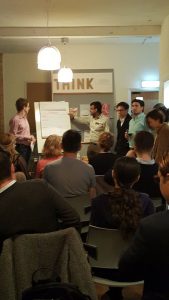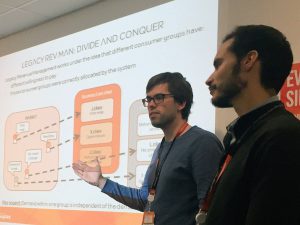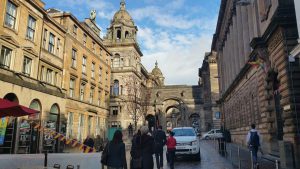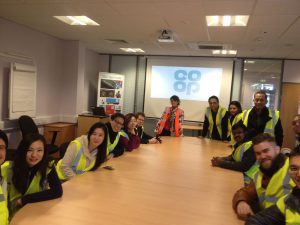January 25, 2017, by Academic contributor
‘Business Practice Week’ marks Nottingham MBA from competitors
 There are many elements that mark Nottingham’s MBA out from others on the market – one of those is Business Practice Week. This unique opportunity gives our students a week out of the classroom to get a rare insight into a range of businesses and valuable face-to-face access to the people running them.
There are many elements that mark Nottingham’s MBA out from others on the market – one of those is Business Practice Week. This unique opportunity gives our students a week out of the classroom to get a rare insight into a range of businesses and valuable face-to-face access to the people running them.
Over the five days of Business Practice Week, MBA students visit companies from different sectors, from SMEs and non-profits to major retail banks and large companies, as well as engaging with Nottingham MBA alumni. Paul Caulfield, Director of the Nottingham MBA, is a firm believer that taking MBA students out of the classroom is as important as the work they do in it. “People often choose an MBA to deepen their learning and apply knowledge in new ways,” he says. “Some MBAs take professional managers out of the workplace and expect learning and application to happen solely in the classroom. Business Practice Week is a chance to take our MBA students out of the classroom and encourage them to integrate current business issues and their prior experience with what they are learning from reading, discussions and lectures.”
During the week students get valuable insights into detailed aspects of the businesses they visit, including a behind-the-scenes look budget airline easyJet, which dedicates a whole day to showing Nottingham’s MBA cohort every aspect of its operation. “To see across a company’s entire operation from website to servicing planes, cabin crew, recruitment is a very unusual opportunity and makes it unique”, says Paul.
day to showing Nottingham’s MBA cohort every aspect of its operation. “To see across a company’s entire operation from website to servicing planes, cabin crew, recruitment is a very unusual opportunity and makes it unique”, says Paul.
The exposure to such a range of businesses not only gives insight and experience, but opens up sectors that MBA students may not otherwise have thought of, says Postgraduate Careers Manager Julie Blant. “People come onto the MBA for different reasons. What Business PracticeWeek does is expose them to business areas that they perhaps have never thought of before. It allows them to see them in practice and shows them how many opportunities could be opened up to them by a change in thinking through doing the MBA.”
Business Practice Week doesn’t just bring the benefit of business knowledge, but helps with cultural integration – a vital element on a course that is virtually global in its make-up. “We have 18 nationalities on our programme,” says Paul. “I like to think of this as a way of them becoming more integrated with UK culture and business practices and establishing their relationships as a cohort outside of the classroom.”
This range of perspectives isn’t only useful for the students involved, but is a good payback to the businesses who take the time to host Nottingham’s MBA students. Paul says: “Gainin g perspectives and different viewpoints is a fundamental management skill. Even seeing the world from that perspective is something that is a valuable competency in any situation. “But equally, when you’ve got the potential of 10-30 people with almost 150 years of management experience between them, it is an amazing opportunity to put something back into the conversation.” That’s exactly what has happened in previous years where students had the opportunity to pass valuable feedback from a range of countries and cultures to independent retailers they visited in Nottingham.
g perspectives and different viewpoints is a fundamental management skill. Even seeing the world from that perspective is something that is a valuable competency in any situation. “But equally, when you’ve got the potential of 10-30 people with almost 150 years of management experience between them, it is an amazing opportunity to put something back into the conversation.” That’s exactly what has happened in previous years where students had the opportunity to pass valuable feedback from a range of countries and cultures to independent retailers they visited in Nottingham.
As a different approach to gaining insight into businesses, Business Practice Week has receiving overwhelmingly positive feedback rates from students, which shows it “hit the mark”, says Paul. Students described value in learning about specific areas including management, finance, marketing, supply chain and logistics, but also broader benefits gained from a week back at the ‘coalface’ of business, including ambition, attention to detail and cultural diversity. Asked what they learned from the individual visits during the week, they listed a range of points including the “importance of being disruptive to gain competitive advantage” and “the credibility which an MBA brings”.
For many, the integration of academia with the workplace was a highlight as well as the importance of reflection and self-criticism – both core aims for Paul and his team. “The great students who will get the most out of this as an experience are the ones who alre ady have a great degree of reflective practice – who already do a bit of checking in on themselves”, he says. “Reflective practice is a highly-prized competency so if they develop that as part of Business Practice Week that’s great. This is an intervention in learning and teaching that is particularly appropriate for those post-experience students and those students who have quite different approaches to learning than MScs. That’s why it sets us apart because we recognise that and are approaching it differently.
ady have a great degree of reflective practice – who already do a bit of checking in on themselves”, he says. “Reflective practice is a highly-prized competency so if they develop that as part of Business Practice Week that’s great. This is an intervention in learning and teaching that is particularly appropriate for those post-experience students and those students who have quite different approaches to learning than MScs. That’s why it sets us apart because we recognise that and are approaching it differently.
“I think some programmes expect transformation to happen by lecture slides alone. But on the Nottingham MBA, Business Practice Week is just one way we develop business leaders for the future by increasing their ability to apply, challenge, rethink and reflect – and that’s what we want from our students.”
No comments yet, fill out a comment to be the first

Leave a Reply